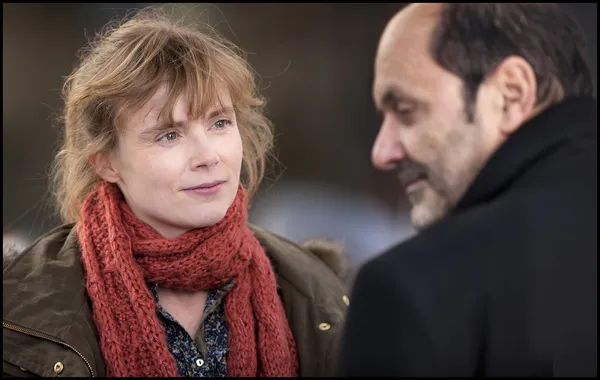Eye For Film >> Movies >> Looking For Hortense (2012) Film Review
Looking For Hortense
Reviewed by: Jennie Kermode

Damien (Jean-Pierre Bacri) is a professor of Japanese civilisation. He teaches some language but most of his focus is on conveying to his students the cultural differences they will need to get to grips with in order to do business in Japan. Still, there is one thing he doesn't understand. A story he tells - about an old man gazing at the sky and seeming to see something that was invisible to him - hints at the tendency of Easterners to pay attention to the whole of a picture whilst Westerners concentrate on objects in the foreground. Looking For Hortense is a film that is all about the bigger picture. Damien blunders through it, struggling to cope with the seemingly unconnected things happening around him. He must learn to step back before his world will make sense.
Damien lives with his long-term partner Iva (Kristin Scott Thomas) and their son Noé (Marin Orcand Tourrès), a sweet boy who understandably resents being constantly sidelined by adults. Iva, a theatre director, often works late, but her habits start to become suspicious after she meets a handsome young actor. Also complicating life are Aurore (Isabelle Carré), the troubled young woman whose overtures of friendship stir confusing emotions in Damien, and a long-established friend who may be suicidal. And then there's his father, Sébastien (Claude Rich), whom he has never got along with but whom his family are pressuring him to talk to about the case of a young refugee threatened with deportation. The eponymous Hortense is the politician with whom the ultimate decision on this rests; 'Hortense' means 'gardener' and this is a film full of resilient, delightful weeds.

Of late, there has been a trend in French romantic comedies to break away from the traditions of the genre or interject complicating elements that bring us a little closer to the way people interact in the real world. The likes of Potiche and Populaire brought fresh aspects of female desire into the mix; here, an incident half way through makes us question the familiar genre tropes of male desire. There is also a conversation between Damien and his father in which the older man expresses bemusement at being considered homosexual because he has sex with men. It highlights the division between cultural expectations and actual human behaviour, ironic within a genre where it is commonplace for twentysomething women to become besotted with fiftysomething men.
With so much going on both narratively and thematically, this film threatens to leave the audience, like Damien, unable to see the wood for the trees. Bacri's performance is sympathetic but not always strong enough to hold it together; similarly, Carré brings charm but not a lot of personality. The result is an uneven film with occasional moments of genius. Fans of the genre will find it worth exploring but shouldn't expect to be swept of their feet. Still, the ending, open to possibility, suggests than in embracing the complexities of modern life the genre is beginning to free itself from formula and find its way back to something more genuinely romantic.
Reviewed on: 01 Aug 2013

















